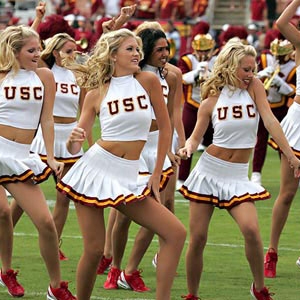College Football Handicapping: Nonconference Vs. Conference Betting Differences
by Trevor Whenham - 9/23/2009
![]()

Some teams have already played a conference game (USC, for one, wishes that they hadn't), but the conference season in college football starts in earnest this weekend.
It's overly simplified and inaccurate to say that the nonconference schedule is like the preseason, but there is no question that games carry a bit more weight when they are against conference opponents. Teams approach the conference schedule differently than the rest of their games, and that means that successful handicappers need to make adjustments to thrive as the season progresses. Here's a look at five ways that you need to adjust to find success in nonconference play:
Familiarity - Though there are rivalry nonconference games that are played every year, for the most part nonconference opponents don't play each other often, and it's not uncommon at all to see teams play that have never played each other before. that all changes in conference play. In some conferences teams play other teams every year, and in others they play at least every other year. Some results occur in nonconference play because of unfamiliarity with particular players or systems. Conference plays means that there are few surprises, and teams mostly know what to expect from systems and players. That means that solid play is more important than fancy play calling in conference play. You can't be fooled by fancy trickery you have seen before the conference schedule starts. Instead, you should look for teams that have exhibited the most solid fundamentals and consistency early in the season.
Similar styles - Some of the biggest edges you'll find in the nonconference season come about as a result of significant difference in playing styles and approaches to the game. That can lead to mismatches, and mismatches are money in the bank. Those mismatches are less common in conference pay because teams generally play the same style of play in a conference - speed oriented in the SEC, or offensively explosive in the Big 12, for example. This happens because teams play each other every year so they have to adjust their style so that they can match up with their opponents as well as they can. In conference play, then, you generally have to look at who is better playing a particular style instead of whether teams can handle opposing styles.
Preparation - In the nonconference season you can often do well by picking on teams that outclass their opponents and are therefore not likely to play to their full capacity. Some teams are very happy just to win games and stay healthy, and they won't exert a full effort for a full game. That can make some big spreads tough to cover. n conference play those attitudes will change. Every win matters, and teams want to win by as much as they can both to stay sharp and to keep impressing people in case there is a tie in the standings at the end of the season. You can't safely assume that a team isn't going to show up at full strength for a conference game.
More scheming - In nonconference play a lot of teams are going to use a limited playbook. That can happen for a few reasons. It could be that the coaching staff wants to implement a system slowly so that young players can adjust. More significantly, though, players won't use the full range of their playbooks before they have to so that they don't give their conference opponents an edge in preparation. You can't necessarily be concerned, then, if a team has shown limited creativity or range of plays in their early games. You would be better served by looking at what the coaching staff has done in the past with their play calling on both sides of the ball than you would by looking at what the team has done early in the season.
Fans are a bigger factor - Fans are going to be more motivated and enthusiastic when their team is playing a long time conference rival than they will be when the opponent is Eastern Nowhere State. That means, in turn, that you need to factor in the effect of the crowd and the home field advantage more in conference play more than you have to in the average nonconference game. All you need to look at to understand the full impact of this is to look at the stunning Washington upset of USC in the opening game of the Pac-10 season. The crowd was a huge factor in that game as Washington drove down the field in the dying minutes to score the winning field goal. They made it impossible for USC to hear anything, and they clearly intimidated the Trojans whenever they made a mistake. The result in that game would very likely have been different if it was played in L.A.
Most Recent College Football Handicapping
- Bowl Game Schedule - College Football Bowl Schedules for 2025-26
- NCAA Football Predictions: Week 14 Opening Line Report and Picks
- NCAA Football Predictions: Week 13 Opening Line Report and Picks
- 2025 College Football National Championship Futures Odds with Expert Betting Predictions
- College Football Playoff: Odds and Best Bets to Make 12-Team Field
- NCAA Football Predictions: Week 10 Opening Line Report and Picks
- NCAA Football Predictions: Week 9 Opening Line Report and Picks
- NCAA Football Predictions: Week 8 Opening Line Report and Picks
- NCAA Football Predictions: Week 6 Opening Line Report and Picks
- NCAA Football Predictions: Week 5 Opening Line Report and Picks
